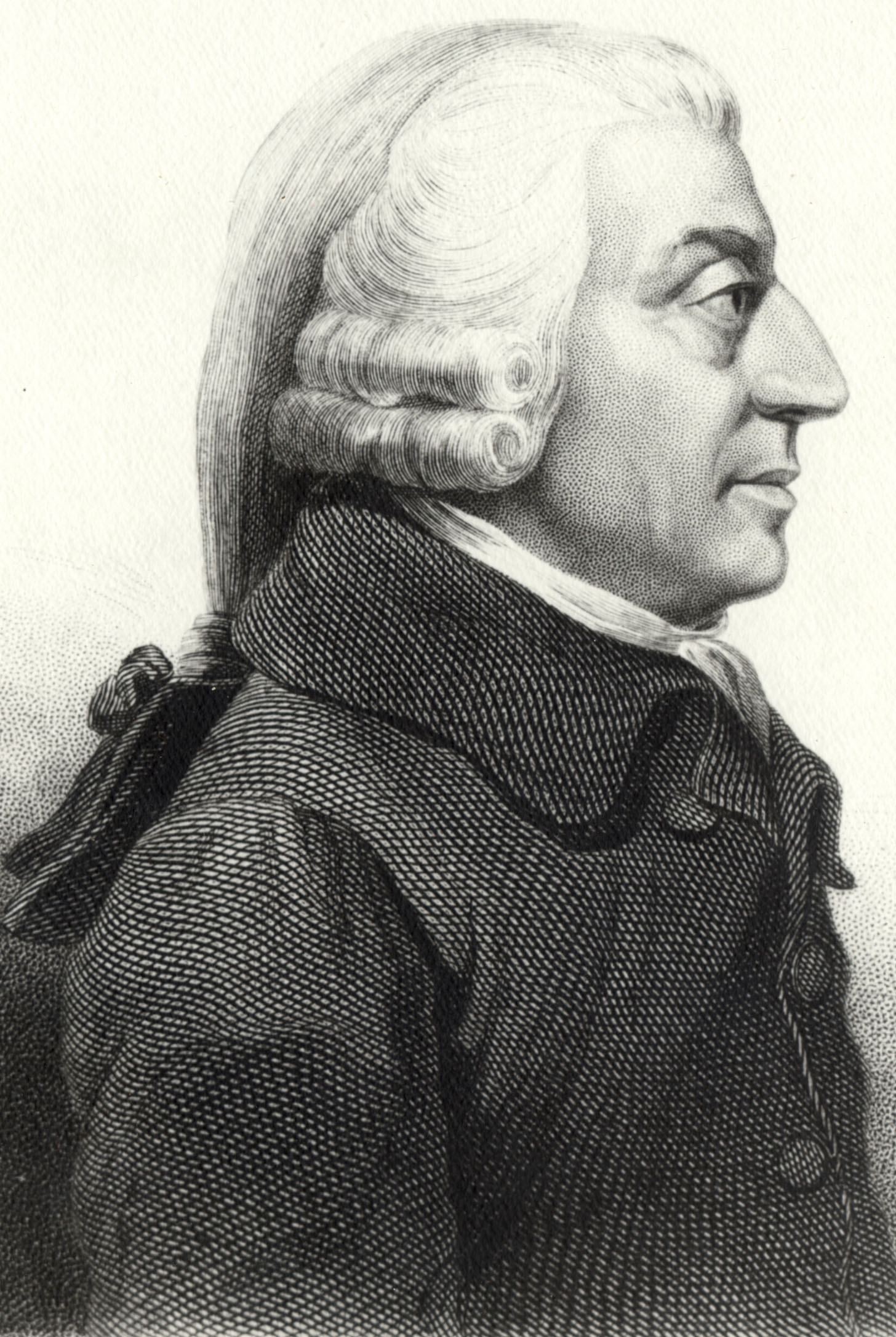Adam Smith Frases famosas
What can be added to the happiness of a man who is in health, who is out of debt, and has a clear conscience?
The theory of moral sentiments: To which is added a dissertation on the origin of languages - Página 62 http://books.google.com.br/books?id=67kIAAAAQAAJ&pg=PA62&lpg=PA62&source=bl&ots=0-p7klr7xK&sig=3Jz1iKFE_acmDiN6fltb6fKDWQE&hl=pt-BR&sa=X&ei=aaEiUIafA4TO9AS17IGYAQ&redir_esc=y#v=onepage&f=false, Adam Smith - Printed for A. Millar, A. Kincaid and J. Bell in Edinburgh; and sold by T. Cadell, 1767 - 478 páginas
“A riqueza de uma nação se mede pela riqueza do povo e não pela riqueza dos príncipes.”
Uma Investigação Sobre a Natureza e a Causa da Riqueza das Nações
“Não é pelo dinheiro em si que os homens o desejam; é pelo que podem comprar com ele.”
Uma Investigação Sobre a Natureza e a Causa da Riqueza das Nações
Uma Investigação Sobre a Natureza e a Causa da Riqueza das Nações
Citações de homens de Adam Smith
“A ambição universal dos homens é viver colhendo o que nunca plantaram.”
citado em "O Poder de mau humor: uma antologia de citações venenosas sobre política, dinheiro e sucesso", Ruy Castro - Companhia das Letras, 1993, ISBN 8571643148, 9788571643147 - 204 páginas
Atribuídas
Variante: A ambição universal do homem é colher o que nunca plantou.
“A humanidade é virtude da mulher; a generosidade é virtude do homem.”
Humanity is the virtue of a woman, generosity that of a man
The theory of moral sentiments: To which is added a dissertation on the origin of languages - Página 285 http://books.google.com.br/books?id=-V4AAAAAMAAJ&pg=PA285, Adam Smith - Printed for A. Millar, A. Kincaid and J. Bell in Edinburgh; and sold by T. Cadell, 1767 - 478 páginas
Citações de idade de Adam Smith
It is not from the benevolence of the butcher, the brewer, or the baker, that we expect our dinner, but from their regard to their own interest. We address ourselves, not to their humanity but to their self-love, and never talk to them of our own necessities but of their advantages.
An Inquiry Into the Nature and Causes of the Wealth of Nations: With a Life of the Author. Also, a View of the Doctrine of Smith Compared with that of the French Economists; with a Method of Facilitating the Study of His Works, Volume 1, Página 20 http://books.google.co.uk/books?id=xTpFAAAAYAAJ&pg=PA20, Adam Smith - Creech, 1806.
Uma Investigação Sobre a Natureza e a Causa da Riqueza das Nações
Uma Investigação Sobre a Natureza e a Causa da Riqueza das Nações
Uma Investigação Sobre a Natureza e a Causa da Riqueza das Nações
Adam Smith frases e citações
“A ciência é o grande antídoto contra o veneno do entusiasmo e da superstição”
Adam Smith, conforme relatado por Singh, Simon - Big Bang - Editora Record - Rio de Janeiro / São Paulo - 2006. ISBN: 85-01-07213-3 (pág. 459)
Atribuídas
Uma Investigação Sobre a Natureza e a Causa da Riqueza das Nações
People of the same trade seldom meet together, even for merriment and diversion, but the conversation ends in a conspiracy against the public, or in some contrivance to raise prices
An inquiry into the nature and causes of the wealth of nations. With notes, and an additional vol., by D. Buchanan - Volume 1, Página 215 http://books.google.com.br/books?id=l2EUAAAAQAAJ&pg=PA215, Adam Smith, David Buchanan - 1814
Atribuídas
Uma Investigação Sobre a Natureza e a Causa da Riqueza das Nações
Uma Investigação Sobre a Natureza e a Causa da Riqueza das Nações
“O único uso do dinheiro é circular bens consumíveis.”
Uma Investigação Sobre a Natureza e a Causa da Riqueza das Nações
Uma Investigação Sobre a Natureza e a Causa da Riqueza das Nações
Adam Smith: Frases em inglês
Chap. I.
The Theory of Moral Sentiments (1759), Part III
Fonte: (1776), Book III, Chapter IV, p. 456.
Fonte: (1776), Book V, Chapter II, Part II, p. 894.
Fonte: (1776), Book IV, Chapter II
“II. The tax which each individual is bound to pay ought to be certain, and not arbitrary.”
Fonte: (1776), Book V, Chapter II, Part II, p. 892.
“All registers which, it is acknowledged, ought to be kept secret, ought certainly never to exist.”
Fonte: (1776), Book V, Chapter II, Part II, Appendix to Articles I and II, p. 935.
Section II, Chap. I.
The Theory of Moral Sentiments (1759), Part VII
Fonte: (1776), Book I, Chapter VIII, p. 87.
Section I, Chap. V.
The Theory of Moral Sentiments (1759), Part I
Section I, Chap. III.
The Theory of Moral Sentiments (1759), Part I
Fonte: The Wealth of Nations (1776), Book IV, Chapter II
Chap. I.
The Theory of Moral Sentiments (1759), Part IV
Section II, Chap. I.
The Theory of Moral Sentiments (1759), Part VI
Fonte: (1776), Book I, Chapter I
“the competition of the poor takes away from the reward of the rich.”
Fonte: (1776), Book I, Chapter X, Part II, p. 154.
Fonte: (1776), Book II, Chapter III, p. 381.
“All money is a matter of belief.”
https://www.amazon.com/All-money-matter-belief-quotes/dp/B01M0HLG6B
Attributed
Section II, Chap. II.
The Theory of Moral Sentiments (1759), Part II
“Corn is a necessary, silver is only a superfluity.”
Fonte: (1776), Book I, Chapter XI, Part III, (First Period) p. 223.
Fonte: (1776), Book V, Chapter III, Part V, p. 1032 (Last Page).
Chap. I.
The Theory of Moral Sentiments (1759), Part IV
Fonte: (1776), Book I, Chapter V, p. 50.
Fonte: (1776), Book I, Chapter XI, Part III, (Conclusion..) p. 282.
Chap. III.
The Theory of Moral Sentiments (1759), Part III
Fonte: (1776), Book IV, Chapter III, Part II, p. 530.
Section II, Chap. I.
The Theory of Moral Sentiments (1759), Part II
Fonte: (1776), Book IV, Chapter V, p. 563.
